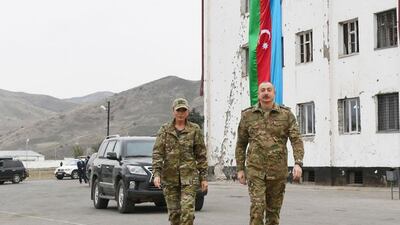Turkey’s parliament on Tuesday granted President Recep Tayyip Erdogan’s government permission to send peacekeepers to Azerbaijan to monitor a ceasefire deal between Azerbaijan and Armenia that aims to end the conflict in the region.
In a show of hands, legislators voted in favour of a one-year mandate allowing the government to send troops to Azerbaijan, where they would observe possible breaches of the truce from a joint Turkish-Russian monitoring centre. The ceasefire ended six weeks of intense fighting between Azerbaijan and Armenia over the Nagorno-Karabakh region.
Mr Erdogan’s government would determine the number of troops to be sent but it was not immediately clear how many the country planned to deploy. The motion states that civilian personnel could also be used as part of the peacekeeping mission.
Last week, the defence ministers of Russia and Turkey signed an agreement to create a joint monitoring centre in Azerbaijan, although technical details of the mission are still being worked out.
Azerbaijan has been pressing for its ally Turkey, which has supported Baku in the conflict, to take an active role in the peace talks and was the first to announce its involvement in the monitoring of the ceasefire agreement.
Russian officials said that Ankara’s involvement will be limited to the work of the monitoring centre on Azerbaijani soil, and Turkish peacekeepers would not go to Nagorno-Karabakh. Russian Foreign Minister Sergey Lavrov said the centre will operate remotely, using drones and other technical means to monitor possible offences.
The mandate further extends Turkey’s military engagements stretching from the Middle East to Africa. The country, which has been trying to craft itself a role as a regional power, has sent troops to Iraq and Syria to battle Kurdish militants and to Libya where its presence helped change the balance of a conflict there in favour of the Tripoli-based government. Ankara also maintains a military presence in Qatar, Somalia and on Cyprus and has peacekeepers in Afghanistan, Lebanon, Africa and the Balkans.
The motion for the deployment in Azerbaijan was backed by four out of five parties in Turkey’s parliament. Mr Erdogan’s government said the Turkish peacekeepers were crucial for the region’s peace and welfare and for Turkey’s national interests.
“Turkey and Azerbaijan, who regard themselves as one state and two people, will continue to struggle together for their independence and future,” said Ismet Yilmaz, who heads the parliamentary defence committee. “It is our historic and strategic responsibility to ensure that [Turkish troops] take up duty at the joint centre to maintain the ceasefire and prevent violations.”
Russian President Vladimir Putin said Tuesday that Turkey will be involved in monitoring the ceasefire alongside Russia, as requested by Azerbaijan.
“We will do it together with Turkey, given that we have a very good experience of co-operation in the Middle East, including in Syria, where we organise joint patrols in the Idlib zone and on the border between Syria and Turkey,” Mr Putin told Russia’s Rossiya 24-state TV channel.
“There is no need in co-operation of this kind in this case, but we agreed to create a joint centre that will use unmanned aerial vehicles, and together we will be monitoring the situation along the separation line with these aircraft,” he said.
Russia, which negotiated the ceasefire, is sending about 2,000 peacekeeping troops under a five-year mandate.
Nagorno-Karabakh lies within Azerbaijan but has been under control of ethnic Armenian forces backed by Armenia since a separatist war there ended in 1994.

